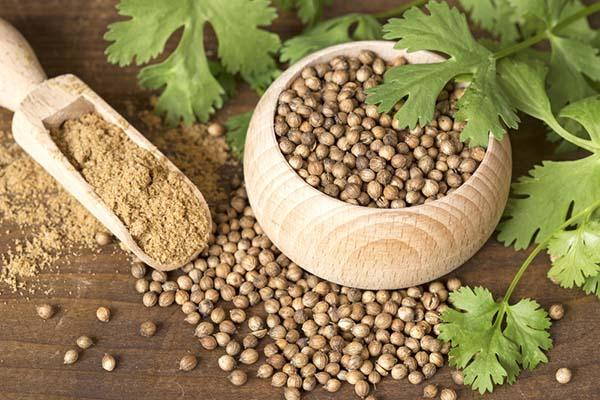Coriander, an aromatic herb known since ancient times, with many beneficial properties and multiple uses not only in the kitchen. A real natural antibiotic to which science also recognizes different characteristics of purification from heavy metals.
Don't store avocado like this: it's dangerousCoriander, an aromatic herb known since ancient times, with many beneficial properties and multiple uses in the kitchen and as a herbal remedy. A real natural antibiotic to which science also recognizes different characteristics of purification from heavy metals.
Il coriander it's a'aromatic herb with very interesting properties and which lends itself to different uses not only of food type. It is a natural seasoning widely used in oriental cuisine that visually resembles parsley but from which it differs greatly in terms of taste.
Also called oriental or Chinese parsley for this reason, coriander is actually a plant native to the Mediterranean even if, as we have already said, it is mainly used in the East. In the kitchen, but also as a natural remedy, both the coriander leaves than the little ones sow (actually the fruits of the plant that are picked ripe).
It is a spice known for millennia and already appreciated by Egyptians, Greeks and Romans. Because? For its many medicinal properties and more.
Index
Properties of coriander
Its stand out antibacterial properties, make coriander is a real natural antibiotic, an effective remedy against the most resistant bacteria. According to the latest research, coriander oil can be used to treat foodborne infections and infections. It would also be a powerful weapon against methicillin-resistant staph aureus. It is also effective against fungi and other microorganisms.
Another important property of coriander is its own antispasmodic and digestive capacity, it is therefore a perfect remedy in case of abdominal swelling, aerophagia, stomach difficulties, irritable colon but also diarrhea. Thanks to these properties, the spice is also excellent for combating lack of appetite.
Coriander also stimulates the nervous system and works like tonic against the sense of tiredness and apathy. Much of its properties are due to the presence of substances useful to our body such as vitamins, mineral salts and fibers, as well as antioxidants, essential oils and more.
Then note its chelating action against heavy metals. It is particularly useful for the removal of mercury, which can be present in the spaces between cells and in the cell nucleus, as well as against cadmium, lead and aluminum present in the bones or nervous system. It is recommended to take coriander accompanied by chlorella, so that the toxins are not reabsorbed.
In summary, cilantro is:
- Antispasmodico
- Digestive
- Natural antibiotic
- Absorbs intestinal gas
- Fights inappetence
- It stimulates the nervous system
- Tonic against fatigue
- Rich in vitamins, minerals and fiber
- Heavy metal chelator

Use coriander
Coriander is a spice that lends itself to various uses in the kitchen as it has a delicate flavor that does not cover that of other foods but on the contrary, it can enhance it by also giving a little spicy taste to dishes. You can use fresh or dried coriander in both leaf and seed form.
A little bit of coriander leaves they are well suited to flavor first courses such as cereal and legume soups, minestrone but also second courses of meat or fish. I semthe, on the other hand, with a different flavor compared to the leaves (they remind a little of that of lemon) are more used to prepare sausages, pickles or as natural remedies.
Together with other spices, then, the seeds go to form curry and garam masala, very famous spice blends known and used above all in India.
The natural remedy is used in particular coriander tea useful against bloating, as a digestive but traditionally also used to combat headaches. Preparing it is very simple: you need a teaspoon of coriander seeds or dried leaves to soak covered for about 5 minutes in a cup of boiling water. Drink after filtering and letting it cool.
Coriander in cooking can be used on:
- Soups
- Soups
- Vegetables
- Beef
- Fish
- Inside spice mix
As a natural remedy in the form of decoction, dry extract or mother tincture it can be useful in case of:
- Digestive problems
- Meteorism
- Irritable colon
- lack of appetite
- Headache
- Fatigue
- Diarrhea
- Heavy metal purification
We have therefore seen the numerous culinary uses and beneficial properties of coriander, but we must underline the fact that not everyone likes it, in fact there are those who attribute a soap aftertaste to it. Because? A recent study found that it is a gene that makes some people perceive an unwelcome taste.
Read also: WHY DOES CORIANDER TASTE SOAP? (VIDEO)
Contraindication of cilantro
Coriander also has contraindications. It should not be used if you take it medicines to regulate stomach and intestinal functions (including antidiarrheals), anxiolytics or antidepressants. Always seek the advice of your doctor even if you use other types of drugs to avoid the risk of interference. Also avoid the use for curative purposes during pregnancy and breastfeeding since there are no studies on the subject. In high doses, coriander can cause nervous or gastrointestinal disorders.
On coriander you might also be interested in:
- Coriander: the forgotten herb that helps cleanse heavy metals
- Why does coriander taste like soap?
- Spices and herbs to combine with each vegetable
Other spices and herbs:
- Rosemary
- Parsley
- Basil
- Timo
- Aneto
- Chives
- Laurel
- Kratom
- nutmeg
- Cloves


























